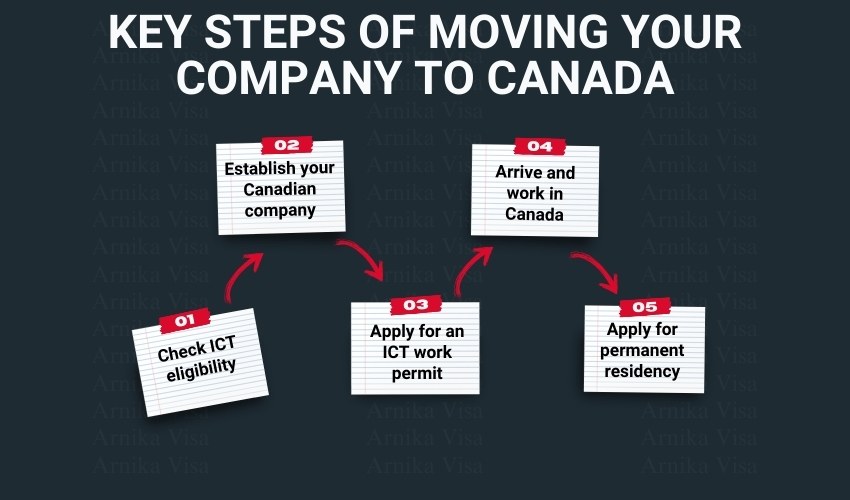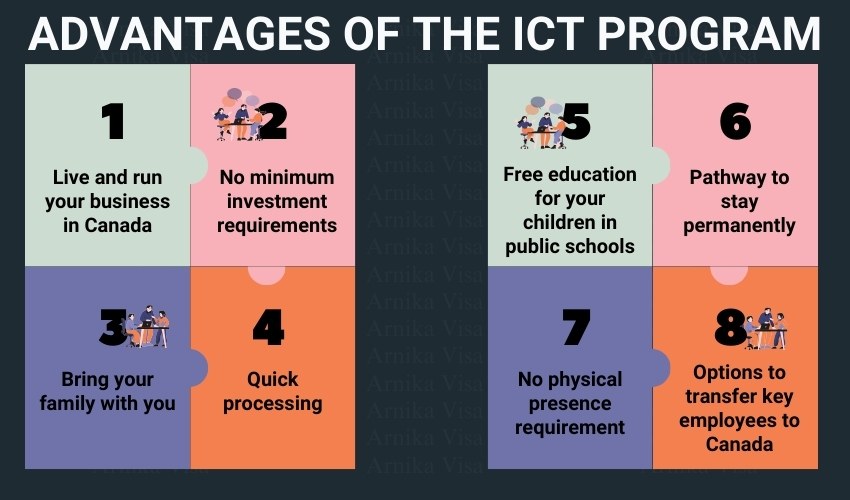ICT Visa – How To Move Your Company To Canada
Under the ICT Visa (Intra Company Transfer Canada), multinational companies are permitted to transfer critical staff to offices in Canada. Corporate mobility is made possible by easing international business operations, promoting innovation, temporarily relocating skilled personnel, satisfying labour market demands, and boosting global trade and economic progress.
Why Canada should be your company’s new home?
Canada has a lot to offer companies wishing to move thier business to the country. The following could serve as grounds for your business to move to Canada:
- Stable Economy: With a variety of industries, sound foundations, and careful budgetary control, Canada’s economy is solid and stable. It offers an environment conducive to business growth and success for companies.
- Skilled Labor force: Canada’s labour force is well-known for being extremely intelligent and capable. Companies can access a pool of highly qualified individuals to further their success if they have a robust education system that attracts talent from various backgrounds and fosters an inventive culture.
- Quality of Life: Canada consistently receives good marks on quality-of-life indices due to its excellent healthcare system, high standard of living, safety, and clean environment. Nationwide, workers and their families can take advantage of lively, engaging communities in cities and regions and a healthy lifestyle.
- Innovation and Technology: Canada is a global leader in these fields, with thriving ecosystems in artificial intelligence, clean technology, life sciences, and advanced manufacturing. Canada’s innovation infrastructure, research institutes, and charitable policies can increase enterprises’ growth and competitiveness.
- Market Access: Canada’s location between the United States and Asia gives it vital market access to North American and international markets. Thanks to modern logistics and transportation networks, companies may instantly connect with suppliers and customers worldwide.
- Diverse and Inclusive Society: Inclusion, diversity, and multiculturalism define Canadian society. Businesses can benefit from a diverse talent pool, a range of perspectives, and a welcoming work environment that values equality, diversity, and inclusion.
- Political Stability: Canada is characterized by solid governance, adherence to the law, and political stability. Businesses that operate within a transparent and predictable regulatory framework can mitigate political and regulatory risks.
- Global Trade Agreements: Canada’s extensive network of free trade agreements with other countries gives businesses preferential access to international markets. These include the Comprehensive Economic and Trade Agreement (CETA) with the European Union and the Canada-United States-Mexico Agreement (CUSMA).
- Supportive Business Environment: Canada offers various tax breaks, programs, and incentives to promote investment and corporate expansion. These include financial aid for new ideas and the uptake of technology, tax breaks for R&D, and support for foreign investment.
Canada offers a compelling value proposition to businesses wishing to migrate because of its robust economy, highly qualified workforce, innovative ecosystem, market access, diversity, political stability, international trade agreements, business-friendly environment, and first-rate infrastructure.

What companies should know about Intra Company Transfer Visa?
Companies considering filing for an intra-company transfer visa to Canada need to be aware of the following crucial elements:
- Qualifications: Verify that the company meets the prerequisites for the ICT visa, including being a multinational company with a qualifying relationship with a Canadian corporation and moving necessary employees for temporary assignments.
- Relationship Qualification: To support the ICT work permit application, create a qualifying connection between the sending corporation (outside Canada) and the Canadian entity (branch, subsidiary, or affiliate). This could provide evidence of joint ownership, control, or a corporate structure.
- Employee Qualifications: Find out if employees have executive, managerial, or specialized knowledge positions vital to the company’s operations. Verify that they meet the ICT ‘s experience and qualification requirements.
- Duration and Purpose: Decide on the exact objective and timeline for the internal company move to Canada. Move to satisfy a pressing business need while aligning with the company’s strategic goals.
- Documentation: Assemble the necessary supporting documentation for the ICT visa application, including job description details, credentials and experience verification, and evidence of the qualifying relationship, among other papers that may be required.
- Compliance: Adhere to all applicable work criteria, immigration laws, and regulations in Canada during the ICT work permit application procedure. Observe the legal requirements about employment agreements, compensation, work permits, and working conditions.
- Employee Support: Provide aid and support to transferred employees and their families during relocation. Give guidance on housing, healthcare, immigration procedures, settlement services, and other requirements.
- Business Objectives: Make sure the ICT transfer is in line with the organization’s business goals to contribute to the success of the Canadian operations. Clearly state the transfer goals and specify the position and responsibilities of the employee in Canada.
- Professional Advice: Speak with human resources personnel, immigration lawyers, and others knowledgeable in ICT visas. They can guarantee adherence to legal and regulatory requirements, provide wise counsel, and assist in navigating challenging immigration procedures.
Eligibility for Intra Company Transfer Visa
The eligibility requirements for the Intra Company Transfer Canada (ICT) program often include the following:
1. Employment with a Multinational Company
Ideally, it would be best if you worked for an international company with a qualifying relationship with a Canadian company. This kind of relationship can be joint ownership, control, or a corporate structure linking the sending company (based outside Canada) to the Canadian organization (branch, subsidiary, or affiliate).
2. Position within the Company
You must work for a multinational company in a managerial, executive, or specialist knowledge capacity. These positions are often defined as follows:
A. Managerial Position
Your main duty as a manager is to oversee an organization, department, division, function, or business component. You oversee a crucial assignment for the business.
B. Executive Position
An executive’s primary responsibility is to oversee a significant project or function inside a company. You are generally only supervised or directed by higher-ranking executives, the board of directors, or stockholders. You define goals and guidelines and have a lot of latitude when making choices.
C. Specialized Knowledge Position
Your knowledge is essential to the company’s operation. The organization’s competitiveness depends on this knowledge, which can be challenging to obtain in the Canadian job market.
3. Temporary Assignment
Under the ICT program, short-term transfers are supported. These allow you to work for a Canadian affiliate, branch, or subsidiary for a predetermined period. The task must satisfy a temporary business requirement for a limited period.
4. Work Experience and Qualifications
You need to have the education, experience, and training required for the position to fulfill your position’s responsibilities in a global company. This could include schooling, training, prior work experience, and position-specific knowledge.
5. Compliance with Canadian Immigration regulations
During the ICT process, you must abide by all Canadian immigration laws, regulations, and procedures. This means obtaining the necessary work permits, following the conditions of the visa, and following all employment laws and other legal requirements.
It’s essential to remember that the prerequisites for enrollment in the ICT program may vary depending on several factors, such as your employment situation, the type of immigration you are subject to, and any relevant bilateral or trade agreements. For precise and up-to-date details regarding your circumstances, visit Immigration, Refugees and Citizenship Canada’s (IRCC) official website or speak with immigration experts.

What is the ICT Processing Time?
The time it takes to process an Intra-Company Transfer (ICT) visa in Canada can vary depending on several factors, including the visa office processing the application, the volume of applications submitted, the completeness of the application, and any additional screening or background checks required.
The Immigration, Refugees and Citizenship Canada (IRCC) website does not estimate ICT Canada Visa Processing Time. However, candidates should often allow one to several weeks for processing.
How do I switch from an ICT visa to a PR?
A candidate in Canada with anan Intra Company Transfer visa has multiple pathways to permanent residence (PR). This usually means figuring out whether you qualify for Express Entry or Provincial Business Immigration streams (PNPs). Once you meet the requirements—which include having the necessary education, work experience, language skills, and a job offer—you can apply for permanent residence (PR). Establishing an Express Entry profile is the initial step toward obtaining permanent residency. After that, one must submit a PR application, apply for and receive an Invitation to Apply (ITA), go through security and medical screenings, and, if accepted, earn a Confirmation of Permanent Residence (COPR).

How Arnika Visa assist you in applying for an ICT Visa?
Investors seeking to apply for a an Intra Company Transfer visa visa may benefit from the comprehensive support provided by a Registered Canadian Immigration Consultant (RCIC) during the application process. Establishing a client’s eligibility, gathering application paperwork, making sure immigration regulations are followed, assisting clients in contacting the proper authorities, and answering inquiries or concerns are all included in this. By applying your understanding of Canadian immigration law and regulations, Arnika Visa will enhance the client’s ICT work permit application, increase their chances of success, and speed up the ICT visa procedure for a smooth and valuable experience.





